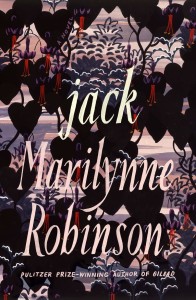Robinson’s fourth Gilead novel is all about Jack, the impossible yet much-loved son of John Ames’s great friend the Rev. Robert Boughton. In the three previous books, Jack has been glimpsed as the prodigal child, polite and charming but a failure in the world’s eyes.
Despite Boughton’s patience and preaching, Jack cannot seem to fit in. He’s not rebellious per se, but cannot resist pilfering small items, especially those with sentimental meaning to their owners. He lies, drinks, skips church, and plays pranks on family and neighbors in the small Iowa town. As Jack himself says in this novel, when he sees something fragile he cannot resist the relief of breaking it, calling himself “A destructive man in a world where everything can be ruined or broken.”
Jack has no illusions about himself. “He had always been drawn to vulnerability, to doing damage where it was possible, because it was possible . . . He was nothing, a mere unshielded nerve, a pang mollified by a drink or two, or shine on his shoes.”
This novel precedes the other three in time, so we meet Jack as a bum in St Louis. Released from jail where he landed for a crime he didn’t commit, he picks up money for drink and cigarettes, and sometimes rent, from stealing or menial jobs that never last. He is haunted by debt collectors ready to use force to get what they want. The only reason Jack doesn’t commit suicide is that he doesn’t want to hurt his father, vowing “to stay alive as long as decency required,” i.e., until Boughton himself dies.
When a sudden shower sends a young black woman’s papers flying, Jack’s ingrained courtesy makes him give her an umbrella that he’s stolen from a nearby park bench and chase down her papers. From his manner and his black suit, Della thinks he is a minister and they begin the conversation that makes up most of the book.
The potential for Jack to do harm to this person he loves and who so unexpectedly loves him is magnified by the 1950s-era law against miscegenation. She could lose her teaching job and both of them could be imprisoned. He acknowledges “the impossibility of going on together when the whole world has made and kept this infernal compact, making transgression and crime of something innocent, if anything could be called innocent, a marriage of true minds. Yes. Exacting from them a precious thing it had no right to and no use for.”
I have known a few Jacks in my life. They are not evil, just different, somehow estranged from ordinary life. They understand society’s rules but remain unmoved by them. So I was grateful for this deep dive into such a person’s mind.
It goes without saying that the book is beautifully written, though with few instances of the transcendence of everyday life that made the other books stand out for me. Only my affection for those volumes and personal interest in understanding Jack kept me going through the long first third of the book.
Jack and Della meet by accident in a graveyard. It is night and they are both locked in, Jack because he meant to sleep rough and Della because she forgot the time. It is a white graveyard where she is not allowed to be, so she is afraid to ask the watchman to let her out. Thus a great chunk of the book is their dialogue about religion, poetry, and philosophy. That part was a slog to read.
The rest of the book is great, though somewhat repetitive, as it would have to be given Jack’s floundering. While Jack is always down on himself, he manages to avoid self-pity, and Robinson finds moments of grace even for this sinner. Certainly grace in the religious sense plays a large role here, as does the Calvinist doctrine of predestination. Adding to the sense that their fates are unavoidable is our knowledge from the other books of how things are going to turn out for the two of them.
I never got a good sense of Della, though of course we mostly see her through Jack’s besotted eyes. Only around her family do we get to see her in action. There’s an interesting story in Della I’d love to read, about an educated black woman raised by a family that believes in separation of the races, navigating the blatantly racist world of the 1950s.
Boughton intrigued me as well, always ready to forgive his beloved son, twisting his theology to find reasons to excuse him. Jack, himself, is not surprised when each attempt to improve himself is foiled, often for reasons outside his control.
I’m not sure I came to a new understanding of the Jacks in my life, but I’m grateful for the chance to see the world through his eyes.
Have you read this or other books in the Gilead quartet?

